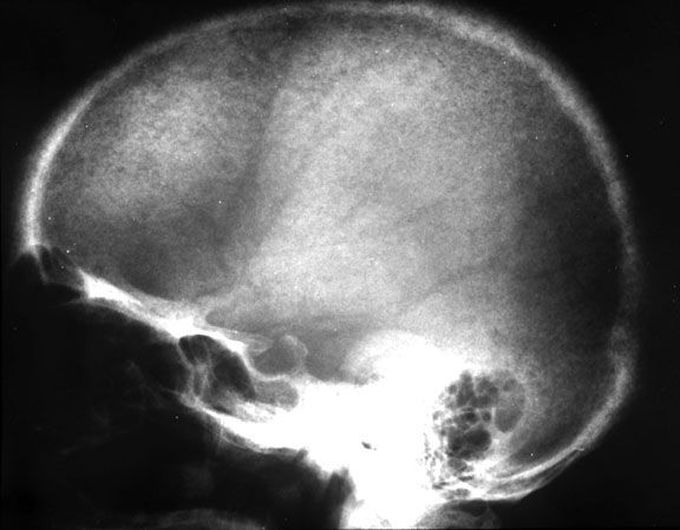


Salt and pepper skull
Parathyroid hormone is the main hormone that maintains a balance of calcium and phosphate in our bodies. When released, parathyroid hormone increases the release of calcium from the bone, reabsorption from the kidney, and secondarily stimulates absorption of calcium from the intestines. It also stimulates secretion of phosphate in the kidney. Hyperparathyroidism is the abnormal secretion of parathyroid hormone. Clinical findings: The classic medical school clinical findings are "Stones, Bones, abdominal moans, and psychiatric overtones," referring to renal calculi, bone pain, peptic ulcers, pancreatitis, and CNS symptoms (confusion lethargy, weakness). Depending on the etiology, the serum calcium may be elevated and phosphate may be decreased. Etiology: Primary Hyperparathyroidism Excessive parathyroid hormone due to a parathyroid gland abnormality 80% parathyroid adenoma 12% parathyroid hyperplasia (rarely from Multiple endocrine neoplasia) 1-3% parathyroid carcinoma Secondary Hyperparathyroidism Excessive parathyroid hormone due to an abnormality elsewhere in the body. Most often this is from chronic renal failure where elevated phosphate and +/- decreased calcium lead to chronic stimulation of the parathyroid gland. Tertiary Hyperparathyroidism Excessive parathyroid hormone due to autonomous secretion of parathyroid hormone. Often this is from prolonged secondary hyperparathyroidism from renal failure. Then, when the patient receives a renal transplant, cause of the secondary hyperparathyroidism is taken away, but the parathyroid glands continue to over secrete parathyroid hormone. Skull shows granular decalcification giving appearance of salt and pepper.
A 70-year-old man presents with difficulty walking, particularly when turning, and a sensation of his feet being "stuck" to the floor. His gait is characterized by hesitation and freezing when initiating steps. Which of the following is most likely to be observed in this patient? A. Spasticity B. Foot drop C.Freezing of gait D. Romberg signBest Probiotics For Womens 2025: Are They More Effective?Basic Brainstem RadiologySpine Radiology ISpine Radiology IIEffects of sugar on teethHyperparathyroidismThyrotoxicosis

